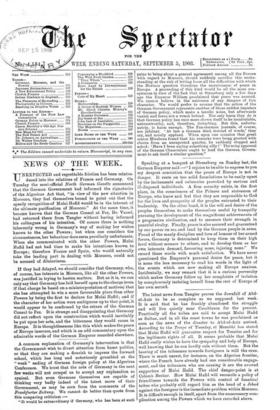A common explanation of Germany's intervention is that the Government
wish to divert attention from home politics, or that they are making a flourish to impress the forward school, which has long and notoriously grumbled at the " weak " ending of German foreign policy at the Algeciras Conference. We trust that the acts of Germany in the next few weeks will not compel us to accept any explanation so cynical. But even Germans themselves are capable of thinking very badly indeed of the latest move of their Government, as may be seen from the comments of the Frankfurter Zeitung. We cannot do better than quote from this unsparing criticism :— "It would be extraordinary if Germany, who has been at such
pains to bring about a general agreement among all the Powers with regard to Morocco, should suddenly sacrifice this under- standing at the risk of letting loose all the difficulties with which the Morocco question threatens the maintenance of peace in Europe. A proceeding of this kind would be all the more con- spicuous in view of the fact that at Strassburg only a few days ago the Emperor William proclaimed that peace was assured. We cannot believe in the existence of any dangers of this character. We would prefer to assume that the action of the German Government represents another of those sudden impulses of German policy, which make a terrific noise, but afterwards vanish and leave not a wrack behind. The only harm they do is that German policy has once more shown itself to be incalculable, untrustworthy, and, therefore, disturbing. But this, unfortu- nately, is harm enough. The Pan-German journals, of course, are jubilant. At last a German deed, instead of words,' they cry, and noisily applaud. When upon one occasion that great orator Mirabeau found that his remarks were being greeted with cheers from an unexpected quarter, he suddenly stopped and asked : 'Have I been saying something silly ? ' The noisy approval of the German Chauvinists ought to lead the German Govern- ment to ask itself a similar question."






































